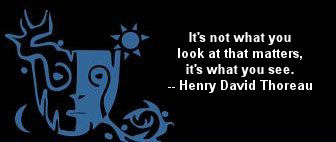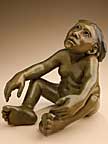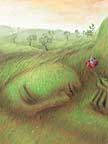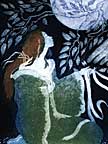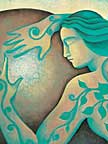|

Excerpt from Ways of the Heart,
Essays Toward an Imaginal Psychology
by Robert D. Romanyshyn
Editor's note: Robert Romanyshyn is a senior core faculty member at the Pacifica Graduate Institute, a Mythic Imagination Institute Corporate Sponsor, and he is one of the original founders of Pacifica's Ph.D. program in Depth Psychology. He has given us permission to quote from his work which is copyrighted material and which can only be reproduced with permission.
In a recent lecture and seminar presented to the C.G. Jung Society of Atlanta, a Mythic Imagination Institute Partner, Romanyshyn told the following story of one of his experiences with the "Animal." This story is also told in his essay. "The Orphan and the Angel," from his book Ways of the Heart, Essays Toward an Imaginal Psychology. In this excerpt, Romanyshyn is initially referring to quotes from Rilke's words, "and already the knowing brutes are aware/ that we don't feel very securely at home/ within our interpreted world..." and from a longer Rilke poem which begins with the following lines, "And yet, within the wakefully warm beast/ there lies the weight and care of a great/sadness..."
What I find astonishing in these words is the way in which Rilke invites us to become acquainted with our melancholy. "The weight and care of a great sadness" that lies within the "wakefully-warm beast" is the memory of a kinship we once seemed to share. For the poet, and thus too for the poetic dimension of our souls, it is as if the Animal dimly remembers for us our departure. It is as if the sadness of this knowing brute is for our folly, for the way in which we continually press after something which once, in the early morning of the world, was perhaps nearer and truer and already attached to us with that infinite tenderness about which the poet speaks. It is as if the Animal marks with its sadness our loss of home, longs for our return, bears witness for a kinship we once shared but then sacrificed when we followed the light. It is as if the Animal awaits and desires our homecoming.
It would be a grave mistake to anthropomorphize the poet's sensibility; it would be a cheap psychology to see within the poet's vision a projection onto nature of our own romantic yearnings. The poet works in the imaginal realm, in that space between the empiricism of facts and the rationalism of ideas. Such a space is always prior to the separation of us from the world, prior to the split of a subjective knower and an objective world. In the imaginal realm of the heart, the flesh of body and that of the world, are a con-spiracy, a breathing together, an intimacy as close as the ties of love. Indeed, this engagement of two bodies, ours and that of the world, this intercourse of the imaginal, is the very root of language. Before meaning there is desire. Every word ever uttered by the human voice was first and originally a way of giving breath and sound to the soul of the world. Inspired by the world, we take in with every breath in the moment of in-spiration that which surrounds us, and in the next moment, the one ex-piration, We breath out and transform air into word.
Perhaps the sadness which the Animal holds for us in the space between us is in faithful remembrance of the sacrifice we have made in crossing to the light. In becoming conscious of the world in a human way, we have participated in its continuous real-ization, in the continuous creation of this world. But to do so we had to take leave of the world's intimate embrace of us, and in doing so it seems we have forgotten our mission, forgotten that we have been ordained, as it were, to assist the evolution of creation. We speak but no longer hear the voice of the world. We speak and proclaim ourselves the authors of meaning, forgetting we are, at our best, the agents of a continual unfolding of creation. The Animal's melancholy recognizes that sacrifice, a mood of kin for kin, just as it is also a sad remembrance of how we seem to have lost our way.
It was a winter day during a visit I made to the Central Park Zoo in New York City. I have always been drawn to zoos in moments of melancholy, drawn to them by loneliness and a hunger which pulls me toward the Animal. Winter days, particularly in mid-week, have always been the best season and time for me to visit, because I have had in such moments some solitude, some private time with the Animal.
 On this occasion I was going to see the gorillas, which the zoo still housed at that time. Standing in front of the cage of a large silver-back male, I felt the presence of the bars between us. The gorilla was sitting in the front corner of his cage, and I could see him only in profile. On occasion, however, as gorillas will do with zoo visitors, he would turn his head for a quick glance in my direction. His deeply set dark black eyes seemed like pools of time, and in those few brief moments of exchange I felt dizzy, as if I could swim through his eyes into another world. But the gorilla would just as quickly look away, and the spell would be broken. On this occasion I was going to see the gorillas, which the zoo still housed at that time. Standing in front of the cage of a large silver-back male, I felt the presence of the bars between us. The gorilla was sitting in the front corner of his cage, and I could see him only in profile. On occasion, however, as gorillas will do with zoo visitors, he would turn his head for a quick glance in my direction. His deeply set dark black eyes seemed like pools of time, and in those few brief moments of exchange I felt dizzy, as if I could swim through his eyes into another world. But the gorilla would just as quickly look away, and the spell would be broken.
The cage was so small, especially for so large an animal, and I wondered how he could bear it. His lethargy was inescapable, and I thought of the many hours of boredom he must daily endure, wondering, too, if I was reading my own sense of loneliness through him. But I had also been with animals in the wild, and the difference in behavior, in gesture, and in that imaginal space between us was pronounced. Caught up in these reveries, I had absent-mindedly withdrawn an orange from my pocket and was tossing it in the air. The gorilla turned and began to watch me. Without thinking, I tossed the orange through the bars to him, momentarily oblivious to the prohibition about feeding the animals. The toss of the orange through the bars covered a distance of only a few feet in "real" space and took perhaps only a second in "real" time. But the gesture, and what unexpectedly followed, bridged an ocean of time and space.
One would have expected the gorilla to take the orange and retreat to a far corner of the cage to eat it. But the gorilla of this day did not do that. On the contrary, he tossed it through the bars back to me. I caught it, and in my astonishment, I tossed it to him again. We continued like this for perhaps three exchanges, until this rhythm between us, this embrace of a game, was broken by the sound of a voice from the far end of the corridor. "Don't feed the animals!" When I turned toward the voice, the gorilla turned away. He moved to the far end of the cage. He kept the orange.
I left the zoo and walked out into the city. The cold, bright, winter afternoon did little to cheer the sadness I felt at having left the gorilla inside. I was different, changed by that encounter, even more lonely in the midst of a crowded city. The gorilla had suspended his appetite for a moment. For the sake of an encounter, he had bridged an immense gap between our worlds. In his gesture of tossing the orange back to me, he had reached out his hand across an emptiness so vast as to be beyond measure. Together we had built a tremulous bridge of gestures, and for a brief time we stood on opposite sides of that bridge, connected in a way that seemed to acknowledge in each other a lost kinship. Even to this day, nearly twenty years later, I know that I shall never forget the eyes of my winter companion on that day. He remembered me, and as strange as it may sound, I felt so grateful for that recognition. But I also felt how far I had come, and I knew with a deep feeling of sadness that we would remain forevermore on opposite sides of this bridge, and that at the best moments of my life, I would be able to stop and linger and turn round to see, once again, what was left behind. I knew that, and I knew, too, that what I saw in his eyes before the spell was broken was his sadness for me.
Return to Mythic Passages Menu
Subscribe to the Mythic Passages e-magazine
|
